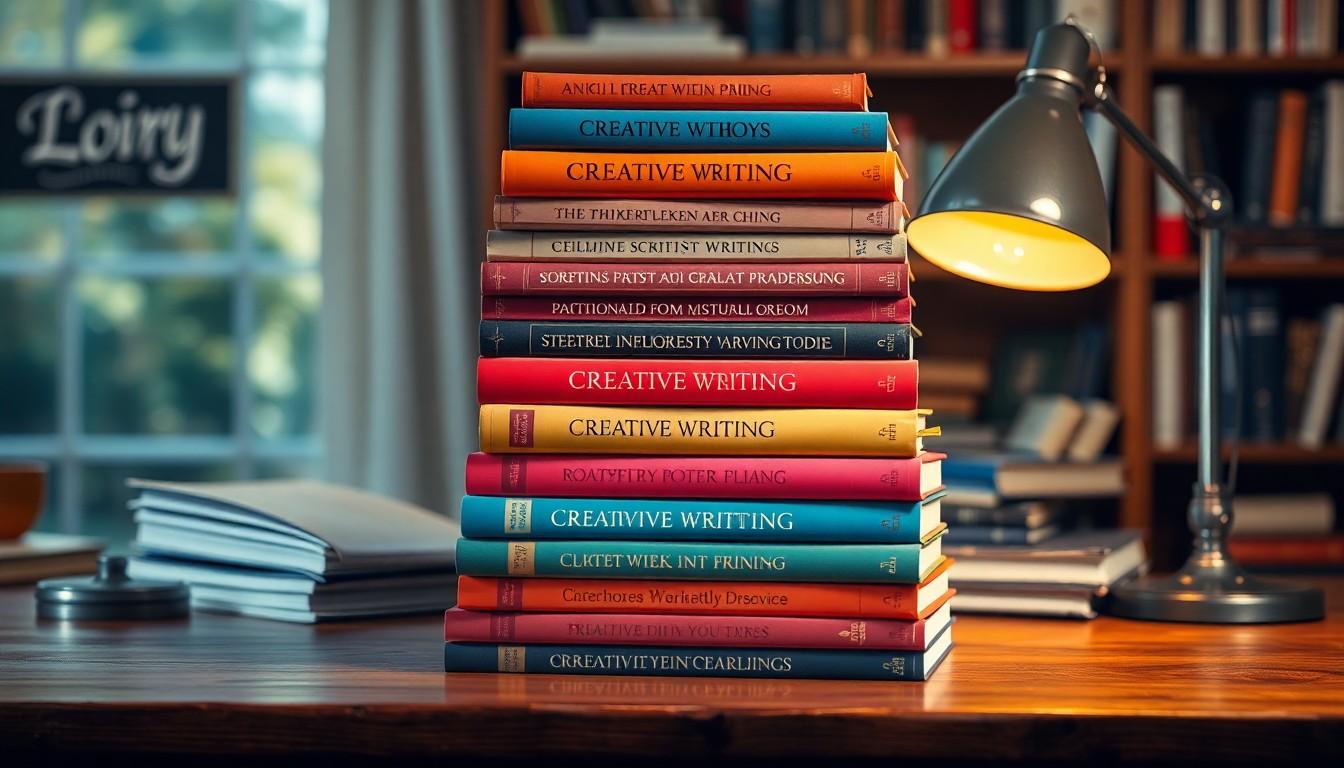In a world bursting with stories waiting to be told, creative writing books are the secret sauce that can turn a mere idea into a literary masterpiece. Whether you’re a budding author or a seasoned wordsmith, these gems offer inspiration, techniques, and a sprinkle of magic to ignite your imagination. Who knew that a book could be your best writing buddy, guiding you through the labyrinth of plot twists and character arcs?
Picture this: you’re sipping coffee, surrounded by a fortress of notebooks, and suddenly, the perfect phrase strikes you. That’s the power of creative writing books—they transform those fleeting thoughts into something extraordinary. So why not dive into this treasure trove of wisdom? With the right guide in hand, you might just find yourself crafting stories that leave readers on the edge of their seats, or at least chuckling at your witty one-liners.
Table of Contents
ToggleOverview of Creative Writing Books
Creative writing books serve as essential instruments for aspiring and seasoned writers. These resources nurture creativity, offering tools and insights that facilitate the art of storytelling.
Importance of Creative Writing
Creative writing fosters imagination and self-expression. It allows individuals to communicate emotions and ideas through varied narratives. Engaging with these books enhances writing skills by providing techniques to develop unique voices. Additionally, gaining insight into the writing process helps writers overcome challenges. The knowledge gained from such resources can transform a writer’s perspective, making the craft more enjoyable and fulfilling.
Key Elements Covered in These Books
Creative writing books encompass various key elements. Character development features prominently, guiding authors in crafting believable personalities. Plot structure is another vital aspect; understanding narrative arcs enables writers to maintain flow and tension. Themes and motifs receive attention, as they enrich storytelling and create depth. Moreover, writing exercises serve to hone skills while encouraging experimentation. Instruction on editing and revision is crucial, ensuring polished final drafts. Collectively, these elements form a comprehensive foundation for effective creative writing.
Types of Creative Writing Books

Creative writing books come in various formats, each catering to different aspects of the writing journey. Understanding these types helps writers choose resources that align with their needs.
Instructional Guides
Instructional guides provide structured approaches to developing writing skills. These books often cover essential topics like character development, plot structure, and narrative techniques. Exercises included in these resources encourage writers to practice their skills regularly. Examples include “The Elements of Style” and “Writing Down the Bones,” both offering practical tips that enhance the writing process. Writers frequently refer to these guides to gain clarity on their craft.
Anthologies and Collections
Anthologies and collections showcase a variety of works from diverse authors. These books present distinct voices and styles, offering insights into different narrative techniques. Reading these collections enhances understanding of storytelling conventions and helps writers broaden their perspectives. Popular anthologies like “The Best American Short Stories” or “The Pushcart Prize” include exemplary works that inspire new ideas and creativity. Engaging with these texts exposes writers to possibilities within their own writing.
Genre-Specific Resources
Genre-specific resources focus on particular writing styles and formats. These books provide in-depth guidance tailored to genres such as science fiction, fantasy, or memoir. Authors gain valuable insights into crafting their narratives within specific frameworks. Titles like “Save the Cat! Writes a Novel” or “The Art of Memoir” serve as crucial tools for genre enthusiasts. Utilizing resources specific to genre helps writers understand audience expectations and enhances their ability to craft compelling stories.
Notable Creative Writing Books
Numerous creative writing books stand out for their impact on writers. These titles serve as essential resources for honing writing skills and igniting creativity.
Classic Titles
“On Writing” by Stephen King combines memoir and masterclass elements, offering insights into the craft and discipline of writing. “Bird by Bird” by Anne Lamott presents practical advice wrapped in humor, encouraging writers to tackle their projects incrementally. “The Artist’s Way” by Julia Cameron emphasizes the importance of creativity through exercises designed to foster artistic expression. “Writing Down the Bones” by Natalie Goldberg blends writing practice with Zen philosophy, guiding writers toward authentic expression. “The Elements of Style” by William Strunk Jr. and E.B. White provides foundational rules of grammar and composition, essential for clear writing.
Modern Must-Reads
“The Writing Revolution” by Judith C. Hochman focuses on teaching writing as a structured skill, providing techniques to enhance student writing. “Big Magic” by Elizabeth Gilbert encourages embracing creativity and overcoming fear, making it a motivational read for many aspiring writers. “Save the Cat! Writes a Novel” by Jessica Brody breaks down story structure, offering a fresh perspective on storytelling. “The Emotional Craft of Fiction” by Donald Maass delves into how to elicit emotions through character and plot development. “Writing Fiction” by Janet Burroway serves as a comprehensive guide, covering various aspects of prose writing and offering essays from renowned authors.
Tips for Choosing the Right Creative Writing Book
Finding the ideal creative writing book involves understanding personal needs and preferences. Consider the following aspects when making this selection.
Assessing Your Skill Level
Recognizing one’s skill level aids in choosing the right book. Beginners benefit from instructional guides that explain fundamental concepts. Intermediate writers might seek books with writing exercises and more advanced techniques. Experienced authors often look for resources that offer insight into refining their unique voices. Knowing the current writing state ensures the book aligns with the writer’s development stage.
Identifying Your Writing Goals
Defining writing goals influences which books to explore. Writers aiming to develop fiction skills might prefer genre-specific resources. Those looking to enhance poetry craft would benefit from anthologies featuring diverse styles. Short story enthusiasts might seek collections focused on that form, while memoir writers may explore personal narrative guides. Aligning the book’s focus with personal aspirations fosters growth and keeps motivation high.
Creative writing books serve as essential companions in a writer’s journey. They not only inspire but also equip writers with the tools needed to hone their craft. By exploring diverse genres and techniques, writers can discover their unique voices and develop compelling narratives.
Engaging with these resources fosters creativity and helps overcome common writing challenges. Whether a novice or a seasoned author, the right book can spark new ideas and enhance storytelling skills. As writers continue to navigate their paths, the insights gained from these invaluable texts will undoubtedly enrich their creative endeavors.





